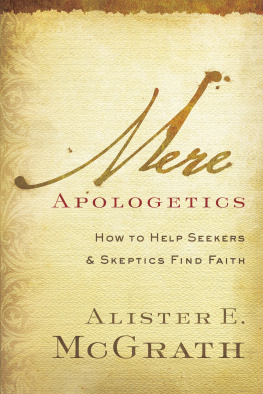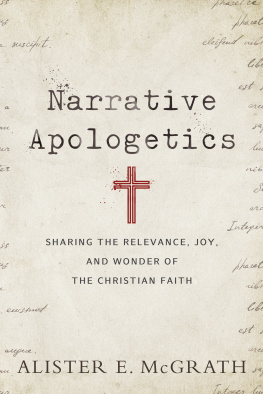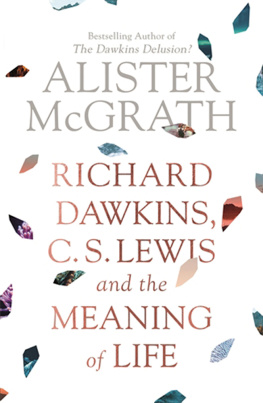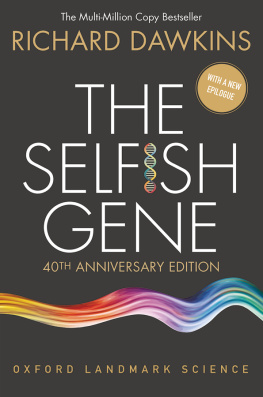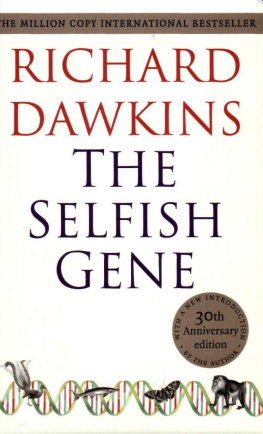
CONTENTS
Guide
Pages
Also by Alister E. McGrath from Wiley-Blackwell
Christianity: An Introduction, Third Edition (2015)
Emil Brunner: A Reappraisal (2014)
The World of C. S. Lewis (2013)
Christian History: An Introduction (2013)
Historical Theology: An Introduction to the History of Christian Thought, Second Edition (2012)
Reformation Thought: An Introduction, Fourth Edition (2012)
Theology: The Basic Readings, Second Edition (edited, 2012)
Theology: The Basics, Third Edition (2012)
Luther's Theology of the Cross: Martin Luther's Theological Breakthrough, Second Edition (2011)
Darwinism and the Divine: Evolutionary Thought and Natural Theology (2011)
The Christian Theology Reader, Fourth Edition (edited, 2011)
Christian Theology: An Introduction, Fifth Edition (2011)
Science and Religion: A New Introduction, Second Edition (2009)
The Open Secret: A New Vision for Natural Theology (2008)
The Order of Things: Explorations in Scientific Theology (2006)
Christianity: An Introduction, Second Edition (2006)
The Intellectual Origins of the European Reformation, Second Edition (2003)
Christian Literature: An Anthology (edited, 2003)
A Brief History of Heaven (2003)
The Blackwell Companion to Protestantism (edited with Darren C. Marks, 2003)
The Future of Christianity (2002)
Reformation Thought: An Introduction, Third Edition (2000)
Christian Spirituality: An Introduction (1999)
Historical Theology: An Introduction (1998)
The Foundations of Dialogue in Science and Religion (1998)
The Blackwell Encyclopedia of Modern Christian Thought (edited, 1995)
A Life of John Calvin (1990)
Note
out of print
Dawkins God
From The Selfish Gene to The God Delusion
Second Edition
Alister E. McGrath
This edition first published 2015
2015 John Wiley & Sons, Ltd
Registered Office
John Wiley & Sons, Ltd, The Atrium, Southern Gate, Chichester, West Sussex, PO19 8SQ, UK
Editorial Offices
350 Main Street, Malden, MA 02148-5020, USA
9600 Garsington Road, Oxford, OX4 2DQ, UK
The Atrium, Southern Gate, Chichester, West Sussex, PO19 8SQ, UK
For details of our global editorial offices, for customer services, and for information about how to apply for permission to reuse the copyright material in this book please see our website at www.wiley.com/wiley-blackwell.
The right of Alister E. McGrath to be identified as the author of this work has been asserted in accordance with the UK Copyright, Designs and Patents Act 1988.
All rights reserved. No part of this publication may be reproduced, stored in a retrieval system, or transmitted, in any form or by any means, electronic, mechanical, photocopying, recording or otherwise, except as permitted by the UK Copyright, Designs and Patents Act 1988, without the prior permission of the publisher.
Wiley also publishes its books in a variety of electronic formats. Some content that appears in print may not be available in electronic books.
Designations used by companies to distinguish their products are often claimed as trademarks. All brand names and product names used in this book are trade names, service marks, trademarks or registered trademarks of their respective owners. The publisher is not associated with any product or vendor mentioned in this book.
Limit of Liability/Disclaimer of Warranty: While the publisher and author have used their best efforts in preparing this book, they make no representations or warranties with respect to the accuracy or completeness of the contents of this book and specifically disclaim any implied warranties of merchantability or fitness for a particular purpose. It is sold on the understanding that the publisher is not engaged in rendering professional services and neither the publisher nor the author shall be liable for damages arising herefrom. If professional advice or other expert assistance is required, the services of a competent professional should be sought.
Library of Congress Cataloging-in-Publication Data
McGrath, Alister E., 1953
Dawkins God : From The Selfish Gene to The God Delusion / Alister E. McGrath. Second edition.
pages cm
Includes bibliographical references and index.
ISBN 978-1-118-96478-1 (pbk.)
1. Apologetics. 2. Dawkins, Richard, 1941 I. Title.
BT1103.M34 2015
261.55dc23
2014029784
A catalogue record for this book is available from the British Library.
Cover image: Top, lr : Biological cell dreaming2004 / iStock; Molecular structure BlackJack3D / iStock; Animated waves Toria / Shutterstock; Chemistry science formula and tablets. Medicine symbol isak55 / Shutterstock; Vertical photo of an old tree in a green forest andreiuc88 / Shutterstock
More attention to the History of Science is needed, as much by scientists as by historians, and especially by biologists, and this should mean a deliberate attempt to understand the thoughts of the great masters of the past, to see in what circumstances or intellectual milieu their ideas were formed, where they took the wrong turning or stopped short on the right track.
R. A. Fisher, speaking at a symposium held in Canberra marking the centenary of the publication of Charles Darwins Origin of Species. Natural Selection from the Genetical Standpoint. Australian Journal of Science 22 (1959): 1617.
Acknowledgments
I owe a particular debt to senior academic colleagues who have read this work in draft form, and were generous in their comments: Denis Alexander, R. J. Berry, Francis Collins, Simon Conway Morris, David C. Livingstone, Michael Ruse, Jeffrey Schloss, and especially Joanna Collicutt. I myself am responsible for any remaining errors of fact or interpretation. Oxford University kindly provided clarification on some important points of detail.
Introduction
I first came across Richard Dawkins in 1977 when I read his Selfish Gene (1976). I was completing my doctoral research in Oxford Universitys department of biochemistry, under the genial supervision of Professor Sir George Radda, who went on to become Chief Executive of the Medical Research Council. I was trying to figure out how biological membranes work so successfully by developing new physical methods to study their behavior.
Although it would be some years before The Selfish Gene achieved the cult status it subsequently enjoyed, it was obviously a marvelous book. I admired Dawkins wonderful way with words, and his ability to explain crucial yet often difficult scientific ideas so clearly. It was popular scientific writing at its best. No surprise, then, that the New York Times commented that it was the sort of popular science writing that makes the reader feel like a genius.
By any standards, The Selfish Gene was a great read stimulating, controversial, and informative. Dawkins had that rare ability to make complex things understandable, without talking down to his audience. Yet Dawkins did more than just make evolutionary theory intelligible. He was willing to set out its implications for every aspect of life, in effect presenting Darwinism as a universal philosophy of life, rather than a mere scientific theory. It was heady stuff far better, in my view, than Jacques Monods earlier work
Next page


